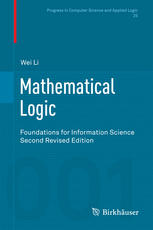

Most ebook files are in PDF format, so you can easily read them using various software such as Foxit Reader or directly on the Google Chrome browser.
Some ebook files are released by publishers in other formats such as .awz, .mobi, .epub, .fb2, etc. You may need to install specific software to read these formats on mobile/PC, such as Calibre.
Please read the tutorial at this link: https://ebookbell.com/faq
We offer FREE conversion to the popular formats you request; however, this may take some time. Therefore, right after payment, please email us, and we will try to provide the service as quickly as possible.
For some exceptional file formats or broken links (if any), please refrain from opening any disputes. Instead, email us first, and we will try to assist within a maximum of 6 hours.
EbookBell Team

0.0
0 reviewsMathematical logic is a branch of mathematics that takes axiom systems and mathematical proofs as its objects of study. This book shows how it can also provide a foundation for the development of information science and technology. The first five chapters systematically present the core topics of classical mathematical logic, including the syntax and models of first-order languages, formal inference systems, computability and representability, and Gödel’s theorems. The last five chapters present extensions and developments of classical mathematical logic, particularly the concepts of version sequences of formal theories and their limits, the system of revision calculus, proschemes (formal descriptions of proof methods and strategies) and their properties, and the theory of inductive inference. All of these themes contribute to a formal theory of axiomatization and its application to the process of developing information technology and scientific theories. The book also describes the paradigm of three kinds of language environments for theories and it presents the basic properties required of a meta-language environment. Finally, the book brings these themes together by describing a workflow for scientific research in the information era in which formal methods, interactive software and human invention are all used to their advantage.
The second edition of the book includes major revisions on the proof of the completeness theorem of the Gentzen system and new contents on the logic of scientific discovery, R-calculus without cut, and the operational semantics of program debugging.
This book represents a valuable reference for graduate and undergraduate students and researchers in mathematics, information science and technology, and other relevant areas of natural sciences. Its first five chapters serve as an undergraduate text in mathematical logic and the last five chapters are addressed to graduate students in relevant disciplines.